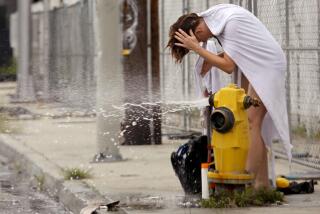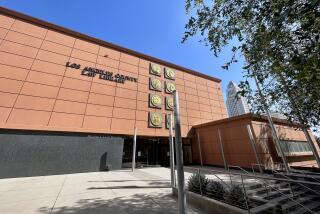Many Find Legal Help Is Beyond Reach
BOSTON — Not poor enough to receive free legal aid but too poor to afford a lawyer, a growing number of Americans are forced to fend for themselves in everything from divorce cases to landlord disputes.
“This means we can’t have a system of equal justice and access to justice by everyone equally,” said Phyllis Goldfarb, a professor at Boston College Law School. “There is a correlation between money and justice, and that’s troubling.”
Under the Constitution, everyone is entitled to a lawyer in criminal cases. And federally funded programs offer legal help to the poor in many civil matters.
But cuts in funding for legal aid during the past decade have meant longer lines and fewer services for the poor who qualify.
And in most states, those who don’t qualify for welfare usually don’t qualify for legal aid, leaving them with few options in civil disputes.
“It’s like the people who go without health insurance--the crunch is on the working class and middle class,” said Allen Feinstein, a Boston lawyer. “They don’t qualify for a reduced fee, but it’s not something they can budget for.”
For five years, Laura and Michael McDonnell were partners in marriage and business while they ran a courier service in Boston.
But now they are separating, the business is suffering and the legal costs are just too much to handle. Laura McDonnell said she sought help at a legal aid office, but wasn’t sure if it would take her case.
So on Friday, the couple waited in line at the Suffolk County Courthouse to see a volunteer lawyer who offers free legal advice there several days a week.
“I don’t know if anyone ever makes enough to afford an attorney,” Laura McDonnell said. “It’s just not an option.”
Legal experts say the McDonnells and many others aren’t getting equal justice.
“You have everything from fathers trying to get visitation rights with their kids, going in alone without a lawyer, to people being sued for debts who are trying to handle it by themselves,” Feinstein said. “By not having legal advice, they get stepped on.”
A study by the American Bar Assn. found that 1 million civil legal problems a year among low-income Illinois residents were not being addressed. Only 20% of the overall need for civil legal help there was being met, the study found, echoing similar findings in Massachusetts and Ohio.
“People who are very poor are eligible for free legal services, and the very rich can hire the best that money can buy. But the vast majority of the middle class has great difficulty affording legal help,” said Lois Knight, a Boston University Law School professor.
Some remedies are available. Hundreds of communities have established so-called alternative dispute resolution programs in recent years to settle civil cases without the cost of the courts. The programs usually are run by a few professionals and a staff of volunteer mediators.
Some states are taking the process a step further by simplifying civil procedures so litigants need less help from lawyers.
In Seattle, the King County Bar Assn. offers low- and moderate-income people a two-hour course on how to get a simple uncontested divorce or modify child support provisions. The Florida bar publishes a booklet of 72 easy-to-use legal forms for everything from obtaining restraining orders to evictions.
In a program in Phoenix, David Bishop, a paralegal for the Maricopa County courts, helps people fill out legal forms and answers questions. Bishop estimated he has seen 6,000 litigants since the program started in 1989.
“I probably turn away 50 or more people every day,” he said. “These are the people who fall through the cracks.”
More to Read
Sign up for Essential California
The most important California stories and recommendations in your inbox every morning.
You may occasionally receive promotional content from the Los Angeles Times.










